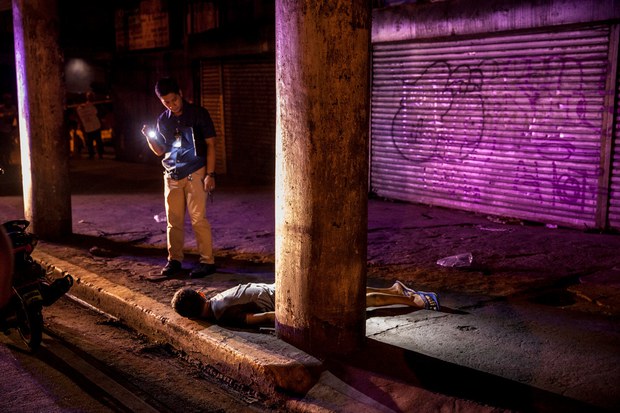Philippine High Court Orders Release of Drug War Data
2019.04.02
Manila
 A police officer shines a flashlight on a drug suspect killed during a counter-narcotics raid in Manila, Nov. 17, 2016.
A police officer shines a flashlight on a drug suspect killed during a counter-narcotics raid in Manila, Nov. 17, 2016.
The Philippine Supreme Court sided with rule of law advocates Tuesday by directing the government to release documents covering thousands of killings carried out under the Duterte administration’s controversial war on illegal drugs.
The justices also denied an appeal from Solicitor General Jose Calida that the documents should be kept strictly between the government and the Supreme Court, said Brian Keith Hosaka, a court spokesman.
Calida was ordered to “submit to the Supreme Court the police reports, copy-furnishing the petitioners,” Hosaka said.
According to the court, the government must prove it had documented all killings, especially those committed during legitimate police anti-drug operations. The court gave the solicitor general’s office 15 days to submit the details of about 3,800 suspects killed in what police claimed were legitimate operations between July 2016 and November 2017.
All the drug operations were legitimate and sanctioned, national police Chief Oscar Albayalde said, adding that raids resulting in deaths or violent encounters were automatically investigated by the internal affairs’ division.
“Yes, of course,” Albayalde said, when asked if the police would follow the court’s directive. “That is an order by the Supreme Court, so we need to comply.”
Calida, on the other hand, described the directive as “patently irrelevant.”
‘A very important decision’
The court ruled on petitions filed by the Center for International Law (CenterLaw) on behalf of the residents of 26 slum areas in central Manila and the Free Legal Assistance Group (Flag), where deadly counter-narcotics raids had unfolded.
“This is an emphatic statement by the highest court of the land that it will not allow the rule of law to be trampled upon in the war on drugs. It is a very important decision,” CenterLaw President Joel Butuyan said.
Neri Colmenares, a human rights lawyer, welcomed the high court’s decision and called on the government to cooperate.
“This will help us see the true situation of human rights in the country in the time of Duterte’s drug war, especially now that Tokhang-style killings are being done against activists and critics of the regime,” Colmenares said.
Tokhang is a combination of two Filipino words that mean “knock and plead” – where police knock on doors and ask occupants to voluntarily undergo drug tests. Critics have said this was a creative way of rounding up drug suspects, many of whom were later killed.
Rights lawyer Chel Diokno said he was pleased with the court’s move to side with victims of extrajudicial killings, adding it was a major step toward getting justice for drug-war victims.
“But this is just one part of the many cases we filed on the war on drugs. The killings must stop. We will fight until the end to get the justice,” he said.
Since Duterte took power in mid-2016, about 5,000 suspected drug dealers and addicts have been killed in what police described as shootouts during law-enforcement operations. Human Rights Watch officials have said that thousands of others were killed, but their deaths were considered under investigation or blamed on vigilantes.
Mark Navales in Cotabato City, Philippines, contributed to this report.







